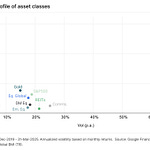To investors,
I have been reading one book per week this year. This past week’s book was Empire State of Mind written by Zack O’Malley Greenburg. Highly recommend reading it. If you are interested in the individual highlights that I made in the physical book, you can read those here. Hope you enjoy these notes every Monday morning.
Book’s main argument:
Jay-Z is one of our generation’s most notable music artists, but he has also established himself as one of the world’s best entrepreneurs. This book chronicles his rise from street corner to corner office, including the wins, losses, and lessons learned. There are stories that you have never heard before and behind-the-scenes decisions that highlight how a kid from the Bronx was able to become a billionaire in two decades.
6 Big Ideas:
💡 Idea #1 — Evolution is the mark of every great success. Jay-Z started out selling drugs to make a living, but was able to evolve into a music artist and then a businessman. This ability to re-invent himself was essential to his accomplishments. Greenburg writes:
Rather than stop and marvel at his own creation, he has continued to evolve personally and professionally.
One of the main reasons for this continued success is Jay-Z’s ability to build and leverage his personal brand.
One of the critiques of Jay-Z early on was that he was changing his music to appeal to the mass audience, which some considered an act of “selling out.” These critiques didn’t go unnoticed and Jay-Z said the following:
“I dumbed down for my audience, doubled my dollars. They criticize me for it, yet they all yell, ‘holla.’” - Jay-Z in Moment of Clarity track
💡 Idea #2 — Hard work is essential to achieving anything great. Jay-Z had natural talent for a number of different activities, but he still understood from an early age that he would have to work diligently to turn talent into profit. One of his childhood mentors, Jaz-O, said the following:
“I taught him that in order to be the best, you don’t have to outwardly hone your craft. But in privacy, hone your craft. People don’t have to know how hard you work to get something.” - Jaz-O on what he taught Jay-Z
This hard work can be seen in the late 1980s when Jay-Z was willing to work for free to learn the craft. Greenburg writes:
Though Jay-Z today grosses millions per show, he spent four months in 1989 working the hip-hop equivalent of an unpaid internship - rapping for room and board, which consisted of a spot on the tour bus floor and a free pass at the buffet.
💡 Idea #3 — Necessity is the mother of invention. Jay-Z and his friend Damon Dash wanted to sign a record deal but no one would take them on. This forced them to create their own label, Roc-A-Fella Records. The rest is history. Greenburg writes:
With Jay-Z’s debut album nearly complete, he and Dash shopped it to all the major record labels, but there were no takers.
So Jay-Z and Dash pooled their resources with a silent partner, Kareem “Biggs” Burke, to start their own record label, Roc-A-Fella Records. They picked the name to signify wealth on the level of John D. Rockefeller, the world’ first billionaire, and to evoke images of the Rockefeller family’s enduring dynasty.
It is telling that they named the record label after the world’s first billionaire and then Jay-Z potentially became hip-hop’s first billionaire. Another lesson that he learned from Damon Dash was that it would pay to have ownership in ventures outside of music. Greenburg writes:
Roc-A-Fella Records soon expanded beyond music, thanks to two of Dash’s guiding principles: “We shouldn’t let other people make money off us, and we shouldn’t give free advertising with our lifestyle.”
Rocawear was the cross-promotional title of the urban clothing line that Dash dreamed up shortly thereafter. The venture started with three sewing machines in the back of Roc-A-Fella Records office; early offerings were limited to t-shirts with the Roc-A-Fella logo stitched to the front.
Within eighteen months of its birth, Rocawear had pulled in $80 million in revenues.
💡 Idea #4 — Constantly understand your goals and lay out a plan to increase the odds of achieving them. Jay-Z realized that his music was going to slow down his business pursuits, so he walked away. Jay-Z came out of retirement later but it is obvious that he wanted to focus when he set his mind to something. Greenburg writes:
Jay-Z’s main motive for retirement was business. He wanted to shift from the music side to the management side of the recording industry.
It was clear Jay-Z’s desire to be seen as a legitimate businessman trumped his need to be seen as a big spender.
A key component of Jay-Z’s plan for a new area of expertise was to find mentors he could learn from. Greenburg writes:
In each case, Jay-Z absorbed the best qualities of his mentor, applied his own considerable talents to the subject at hand, quickly surpassed said mentor, and moved “on to the next one.”
💡 Idea #5 — You have to constantly ask questions and try to learn new things. Jay-Z mastered this. He was never afraid to sound stupid or ask the simple question. Greenburg writes:
Those who crossed paths with Jay-Z in the boardroom noticed his inquisitive nature. “One of the things I like about the guy is that he wants to learn. He has a thirst for knowledge. And even when he was younger, he was always asking questions. If it was backstage or in a studio or a business meeting, he wasn’t afraid to say ‘Hey, how does this work?’ Or, ‘What’s the structure of that kind of deal?’ He was always very curious about business deals. Which lends itself well to someone who would like to transition from being an artist to being a business impresario.” — Bernie Resnick (entertainment lawyer) on Jay-Z
Learning isn’t the only ingredient needed for success. You have to be a risk-taker and be willing to bet on yourself. Jay-Z did this when he bought back his music contract as he left Def Jam. Greenburg writes:
Jay-Z had to pay Def Jam $5 million to buy out his contractual obligation to make one final album. “I wanted to have it back for a number of reasons, the most important being that it wasn’t consistent with the type of business I planned. It was more so the principle that the amount of money. It was about owning my own masters and owning my own companies, but you have to pay for the privilege.”
💡 Idea #6 — The person you marry is one of the most important life decisions that you make. Jay-Z and Beyonce were the ultimate partnership. They compliment each other incredibly well and the results speak for themselves.
“In terms of the entertainment industry, it’s the biggest merger [Jay-Z and Beyoncé] you could possibly imagine. It’s two superpowers coming together. It’s sort of Microsoft and Apple deciding they can be literally in bed together.” — music historian Jeff Chang
It is obvious that both Jay-Z and Beyonce knew the benefits that they brought to each other.
“We exchanged audiences. Her records are huge Top 40 records, and she helped ‘Bonnie and Clyde’ go to number one. What I gave her was a street credibility, a different edge.” — Jay-z on Beyoncé
Memorable quotes:
One of the main reasons for this continued success is Jay-Z’s ability to build and leverage his personal brand.
From a business perspective, moving toward the mainstream was the right decision.
[Jay-Z] making himself synonymous with the New York Yankees — the winningest team in the history of professional sports.
When it comes to business, Jay-Z is a cold pragmatist.
New albums had become necessary only as means to stay relevant, best used as canvasses for artistic statements or vessels for commercial partnerships — or in Jay-Z’s case, both.
By 2011, he’d amassed a fortune of $450 million; it seemed he was spending more time with billionaires — Warren Buffett, Bill Gates, Michael Bloomberg, Mikhail Prokhorov, and Oprah Winfrey, for example — than with other rappers.
Public perception can take a long time to shift — though Jay-Z tried early and often to transform his persona from cocaine kingpin to music mogul and tastemaker, it took more than a decade to get most people to believe he had changed.
Jay-Z managed to propel himself from street corner to corner office without the benefit of a college degree not because he wanted to, but because he had to.
Pomp’s Takeaways:
The first big takeaway is that many of the hip hop artists from the 1990s/2000s timeframe ended up being great entrepreneurs. Jay-Z is the perfect example. He has continued to reinvent himself and eventually became a billionaire. When you unpack this evolution, you notice that some of it was out of necessity and some of it was strategic. There is a theme of pursuing the larger market opportunity as well. It helps to constantly ask yourself “what should my next act be?”
My second big takeaway was how Jay-Z followed the same principles of learning, asking questions, and seeking mentors just as so many of the entrepreneurs and investors I’ve read about over the years. Even though Jay-Z is notorious for not writing down his lyrics and has a natural talent for music, he still persistently worked to turn that talent into a global opportunity. Nothing of scale and sustainable success is by accident — hard work is always a key component.
My third big takeaway is how cyclical the themes of “betting on yourself,” “going direct,” and “solopreneur” seem to be. These are themes that people use when discussing newsletters, podcasts, and other digital media forms. It is exactly what Jay-Z and his friends were doing 20 years ago though. Owning your business and products has also stood the test of time as a strategy. Be willing to take a risk!
My fourth big takeaway was how important Beyonce was to Jay-Z’s life. He seems to have matured after meeting her and their marriage has been a big part of his ability to stay relevant over a few decades. Marriage is a big decision so don’t take it lightly. It makes me happy and proud to have married Polina, who appears to have unintentionally done many of the things that Beyonce did for Jay-Z.
My final big takeaway was how much the business world can learn from the hip hop community. We know that hip hop sets culture in America, but there are an unlimited number of business lessons available as well. You can learn something from anyone you encounter. Even if industries don’t appear to be related, they are usually more similar than you realize. Look hard. Be curious. Ask questions. Find one thing that you can import to your work, your career, your industry, or your business. This is the way.
As I mentioned, this past week’s book was Empire State of Mind written by Zack O’Malley Greenburg. Highly recommend reading it. If you are interested in the individual highlights that I made in the physical book, you can read those here. Hope you enjoy these notes every Monday. Feel free to leave a comment - I read all of them.
-Pomp
Note: Make sure you are subscribed to receive these personal notes each Monday morning.












Share this post